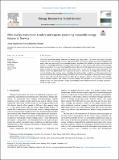Files in this item
Elite energy transitions : leaders and experts promoting renewable energy futures in Norway
Item metadata
| dc.contributor.author | Rauter, Anna Raphaela Kyra Katharina | |
| dc.date.accessioned | 2022-02-23T10:30:11Z | |
| dc.date.available | 2022-02-23T10:30:11Z | |
| dc.date.issued | 2022-06-01 | |
| dc.identifier | 278023747 | |
| dc.identifier | 9539a152-c8d5-4064-addd-6f35f6b93a40 | |
| dc.identifier | 85124616639 | |
| dc.identifier | 000786607100008 | |
| dc.identifier.citation | Rauter , A R K K 2022 , ' Elite energy transitions : leaders and experts promoting renewable energy futures in Norway ' , Energy Research and Social Science , vol. 88 , 102509 . https://doi.org/10.1016/j.erss.2022.102509 | en |
| dc.identifier.issn | 2214-6296 | |
| dc.identifier.other | RIS: urn:2A50003229601A611EFE3D47254DB57E | |
| dc.identifier.uri | https://hdl.handle.net/10023/24929 | |
| dc.description | This project has received funding from the European Research Council (ERC) under the European Union's Horizon 2020 research and innovation programme under grant agreement No. 715146. | en |
| dc.description.abstract | This article shows how energy transitions are advanced by energy elites – the leaders and experts of energy companies. While the dominant literature suggests that elites resist societal changes, this research highlights that energy elites are instrumental in the promotion of energy transitions. The findings in this article are based on 18 months of ethnographic fieldwork in energy companies based in Oslo, Norway, and analysed using anthropological perspectives. The research has found that energy elites, faced with climate change concerns, re-imagined energy futures and accordingly reoriented their careers. Out of a total of 109 energy elites interviewed, 30% decided to leave the hydrocarbon sector in pursuit of careers in renewables. As energy elites left their occupations in oil and gas, they inspired others – including elites and non-elites – to follow suit. This suggests that elites are not only crucial to the pursuit of energy transitions but can also be key pillars of promoting societal changes. What is more, the research demonstrates that elites do not operate in isolation. Factors like social networks, politico-economic contexts, and changes in investor climates all contribute to the promotion of low-carbon energy futures. This article provides a deeper understanding of the multifaceted drivers of energy transitions – in Norway and beyond. | |
| dc.format.extent | 10 | |
| dc.format.extent | 1568748 | |
| dc.language.iso | eng | |
| dc.relation.ispartof | Energy Research and Social Science | en |
| dc.subject | Energy elites | en |
| dc.subject | Energy transitions | en |
| dc.subject | Renewables | en |
| dc.subject | Oil and gas | en |
| dc.subject | Climate change | en |
| dc.subject | Norway | en |
| dc.subject | GF Human ecology. Anthropogeography | en |
| dc.subject | HD Industries. Land use. Labor | en |
| dc.subject | 3rd-DAS | en |
| dc.subject | SDG 7 - Affordable and Clean Energy | en |
| dc.subject | SDG 13 - Climate Action | en |
| dc.subject | SDG 15 - Life on Land | en |
| dc.subject | NIS | en |
| dc.subject | MCC | en |
| dc.subject.lcc | GF | en |
| dc.subject.lcc | HD | en |
| dc.title | Elite energy transitions : leaders and experts promoting renewable energy futures in Norway | en |
| dc.type | Journal article | en |
| dc.contributor.sponsor | European Research Council | en |
| dc.contributor.institution | University of St Andrews. Centre for Energy Ethics | en |
| dc.contributor.institution | University of St Andrews. Social Anthropology | en |
| dc.identifier.doi | https://doi.org/10.1016/j.erss.2022.102509 | |
| dc.description.status | Peer reviewed | en |
| dc.identifier.grantnumber | 715146 | en |
This item appears in the following Collection(s)
Items in the St Andrews Research Repository are protected by copyright, with all rights reserved, unless otherwise indicated.

